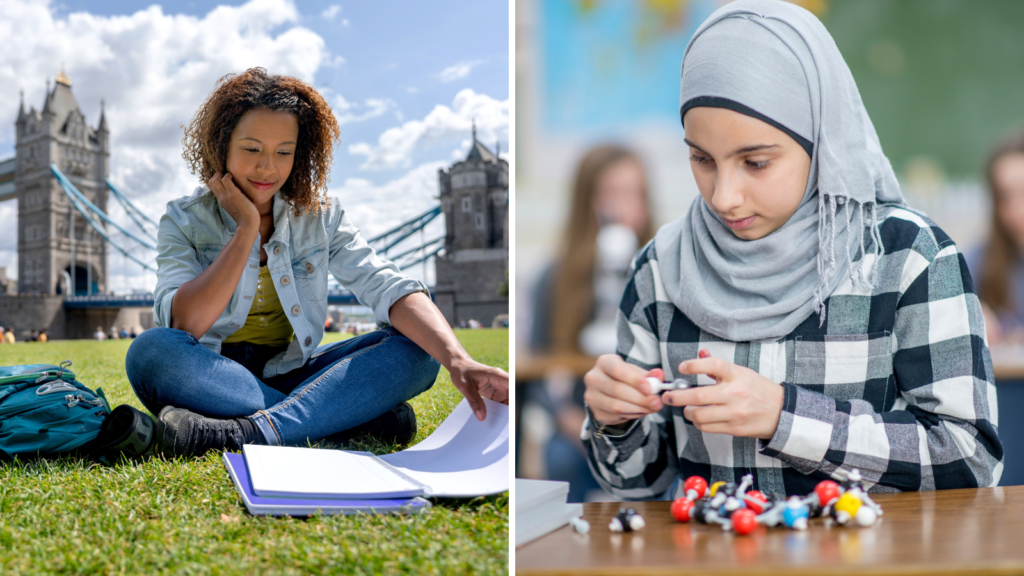There are an estimated 235 million students worldwide, of which 6 million are studying abroad[1]. At least half of these students are studying outside their region. Whilst the data does not show us the motivation for students to study abroad, for most it will be to seek greater prosperity through the experiences and opportunities afforded through studying in another country. The Global Convention on the Recognition of Qualifications concerning higher education is the first UN Treaty on higher education with a global scope. This was ratified by 22 states, including the United Kingdom. It sets out universal principles for fair, transparent and non-discriminatory recognition of higher education qualifications, enabling access to study or employment.
Figures from UNESCO estimate that only 6% of refugees and displaced persons are able to access higher or tertiary education, the main barrier being the lack of paperwork to prove their prior qualifications. Initiatives such as the UNESCO Qualifications Passport (UQP) build on the success of the European Qualifications Passport for Refugees[2], implemented through a globally standardised tool that recognizes prior learning in the absence of documentation. The UK was a project partner on this initiative.
Humanity must guarantee the right to education to all. Through academic mobility we can surely enrich the global knowledge economy and stimulate economic growth through student migration. Educational institutions have a distinct role to play in the fabric of a just, sustainable world, countering global challenges through their research, teaching and outreach on a local, national and international scale. Across each UN Sustainable Development Goal, opportunities lie for universities and training bodies to enrich social, economic and human capital for the benefit of all. Education is truly an area whose modalities can traverse borders towards an equitable world, promoting inclusion and lifelong learning.
Quality Education (SDG 4,) particularly 4.7 calls for a world where:
By 2030, learners have acquired the knowledge, and skills to promote sustainable development, including, among others, through education for sustainable development and sustainable lifestyles, human rights, gender equality, promotion of a culture of peace and non-violence, global citizenship and appreciation of cultural diversity and of culture’s contribution to sustainable development.
A campus open to students from all over the world provides for classrooms enriched by intercultural diversity, equipping students for the challenges of the global economy.
The UK Higher Education sector is embattled beyond the marketisation of the sector ushered in by the Blair era. The last 25 years have seen fire-fighting against successive reviews (Browne, Augar,) changes to regulatory arrangements; budget cuts, fraught industrial relations and a global pandemic. The insipid rise of popularism within the UK political landscape, together with the impact of Brexit, creates a new set of challenges across research and recruitment. The adversarial position that the government has adopted to migration in all its forms further adds to the storm, with the successive policy decisions on student visas over the last ten years further damaging the institutions’ ability to attract international students.
Compare two pieces of news from May 2023: First, publication of The costs and benefits of international higher education students to the UK economy by the Higher Education Policy Institute working with partners to outline the contribution international students make to the UK economy. Even when accounting for dependents and other costs, that contribution is tremendous[3]:
· The economic benefits of international students rose to £41.9bn between 2018/19 and 2021/22.
· On average, each parliamentary constituency is £58m (per constituency) better off because of international students. This equates to approximately £560 per citizen.
· Every 11 non-EU students generates £1 million worth of net economic impact for the UK economy
Second, and at odds with the first, is the government’s new plans to curtail international students bringing dependents with them whilst they study in the UK unless they are studying on postgraduate research courses. A news bulletin released by the government outlines the statistics rather more grimly. The Office for National Statistics estimates net migration at 500,000 from June 2021 to June 2022. Although the UK offered schemes for those from Ukraine and Hong Kong, there were still “over half a million” student visas issued within the same period, whilst the number of dependents for overseas students has increased by 750% since 2019, to 136,000 people[4]. The inclusion of the percentage seems purposeful, you can almost hear the click-clack of the tabloid press rolling out words such as “a whopping 750%” or “soaring figures.” The language continues to enhance the distinction – these are overseas students. In other words, foreigners. The government claims that taking action will enable “banning of people from using the student visa route as backdoor route to work in the UK.” Such language is obfuscating – the net migration figure lumps everyone together, with no differentiation in the types of migration. The UK remains as ever at odds with itself, wanting to be seen as both benevolent and the destination of choice for “the best and the brightest,” in the same playbook language that the response to the pandemic was to be “world beating,” yet wants to close its doors to all but those perceived as the “right” type of migrants.
The response to the government’s announcement was not clear-cut across the international education sector. Whilst most decry as reactionary and a craven effort to massage the net migration figures, others have observed that this policy intervention may ease local burdens (student housing, school places, GP waiting lists.) Such policymaking will have a disproportionate effect on women, children and contradict human rights legislation. The rhetoric is similar to those coming to the UK in small boats: there is no room for you, we are already stretched too thinly.
All education institutions have a moral obligation to contribute to the preservation of civil society, a commitment to prepare young people to participate in society and the global economy and support efforts to give equality of access to the most vulnerable in our world, refugees and displaced persons. Education is the tool at our disposal to overcome the limitations of statecraft and arbitrary policy making which comes at the cost of compassion and basic humanity. A first step for us all is to call out the pejorative language that is allowed to persist in talking about migration in all of its forms. In order to meet the responsibilities of the Sustainable Development Goals, higher education should be accessible to all. A joined-up approach is required across all agencies involved in policy making to remove barriers created by populist idealogues. Surely it is only through education that we can prevent conflict and foster dialogue and peaceful resolution within our communities.
[1] Global Convention on Higher Education | UNESCO
[2] European Qualifications Passport for Refugees – Education (coe.int)
[3] International students boost UK economy by £41.9 billion – HEPI
[4] https://www.gov.uk/government/news/changes-to-student-visa-route-will-reduce-net-migration




